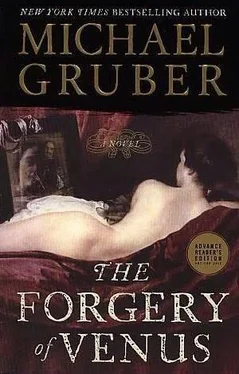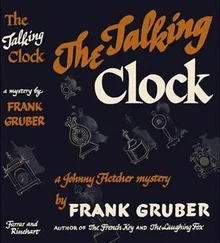In the main room of the gallery my actresses (except Kate) were still up there with the sacred red dots that said they’d sold, and there was a review from the Village Voice, framed and hanging nearby. It was not bad. The guy had actually got it that it wasn’t just a postmodernist appropriation but a genuine effort to use the traditional means of painting to penetrate character, to pry up under the mask of celebrity. And he hoped I’d continue to do work in that vein. Unfortunately he closed with a little riff about how Andy Warhol had started as a commercial artist and look where he’d gone. Yeah, look.
I said, “Very nice. It’s always a treat to be lumped with Warhol.”
Lotte said, “Don’t be ridiculous. It’s a great review. I’ve had calls from some very big collectors; do you have any more work to show? This could be a very good thing for you.”
I looked at her and I was about to say something cynical and nasty, which is what I usually did in these situations, but I saw she was really pleased-her face was positively shining with happiness and admiration-so I just nodded and, after an awkward moment of suspension, hugged her, and she hugged me back.
Then I said, “Well, good, but they’re going to have to wait,” meaning I had to do the Italian job first, and she was fine with that and was glad I was at least out of the magazine business for a while. I told her about some ideas I’d had for paintings, and my God, it was nice to talk with Lotte again about painting and real work, just like we were back at the start, and I left her with the hope that my work had turned a corner.
I went home, dreading the solitude that might require me to actually paint something. But as it happened, as I climbed the stairs to my loft I saw that the door to Bosco’s loft was open, and when I looked in I found my neighbor examining himself in the dusty mirror that hangs next to the door. He was wearing an antique tuxedo jacket over jeans and a black Nine Inch Nails tour T-shirt, and I remembered his show and that I had promised to walk over to it with him.
Although Bosco has a perfectly serviceable wife and children, plus an agent, plus a gallery, he likes to have me or some other artist hang out with him when he goes to one of his openings. It’s a tradition I’d always supported with my usual masochism, so we went out and made the short walk up Broadway to Broome. The gallery is west of Broadway and by the time we got to the corner we could see something was up. There were two police cars parked with their lights flashing at the junction of the two streets, blocking traffic, and when we turned the corner we saw that Broome Street was jammed with people, I guessed at least five hundred of them, and maybe twenty cops. A couple of TV vans rumbled and hummed near the gallery entrance and lit it with their glare.
“Man, what a crowd!” said Bosco. “And television. This is great!” He was grinning; his teeth went red then yellow as they alternately glowed in the cop light and the overhead crime-lights. He said, “Hey, let’s get in there before all the champagne’s gone,” and strode off toward the crowd.
Or the mob, as I ought to call it. Even at half a block away I could tell that it wasn’t a crowd of art lovers. I heard the sound of glass breaking and a scream, and then distant sirens. Behind me a large black van appeared from Broadway, halted near the patrol cars, and disgorged a squad of tactical police in black uniforms with helmets, face shields, and long batons. They started to form a line and I spun on my heel and ran away. Then I went calmly to a Chinese restaurant and ordered some take-out. Shameful, yes, but what could I have done?
When I got back to my place I sat down with my lo mein and turned on the TV. There was a woman anchoring the local news with the grave look and lowered voice suitable for portentous matters, and she was talking to someone offscreen; it was a breaking-news moment, and then the scene flashed to a guy with a microphone who was standing not far from where I’d last seen Bosco. Behind him you could see what remained of the gallery, its window smashed, its blackened smoking interior, and firemen walking through the ruins doing their usual after-fire cleanup. The reporter was saying, “No, Karen, we don’t know the condition yet of the artist, Dennis Bosco, but witnesses say he was badly beaten and taken to St. Vincent ’s Hospital. We’ll get back to you as soon as we have any more information.”
Some more questioning back and forth about injuries and arrests, and then they showed some footage of Bosco’s 9/11 piece and a tape taken earlier at the gallery, the stuff I’d seen the start of in real life, Bosco walking into the crowd around the front of the gallery and then being recognized and getting shoved and screamed at by a group of big guys and then going down in a flurry of kicks and blows, and the cops shoving through to rescue him, not very enthusiastically I thought. And then a trash can going through the window, and then the mob pushing through into the gallery and screaming art lovers streaming out and getting their lumps too, some of them, and then there was a blaze of fire that made the video go white and there were shouts and screams. The final shot was the tactical police finally moving in like imperial storm troopers and clearing the street.
I couldn’t stop watching, even through the talking heads and the stupid street interviews, some of which had to have the obscenities bleeped out. Then later there was video of Bosco, his face a pudding of blood, on a gurney being loaded onto an ambulance, from which they cut to more interviews, every one of whom agreed that it was obscene to make fun of 9/11 and especially to use the actual ashes of that day, and that the artist had gotten what he deserved. There was a spokesman from the mayor’s office who said the usual about free speech and our constitutional values and that the culprits would be prosecuted, but he didn’t sound too enthusiastic about it either, and why should he be, since the affray was clearly the doing of off-duty cops and firemen. The whole thing was a work of art.
I tried to call Connie Bosco in Jersey, but the line was busy. Then I called St. Vincent ’s and found that Bosco was in surgery and they were only giving information out to family members. So I went to sleep.
I visited the hospital the next day but they wouldn’t let me in to see him. The floor was guarded by three big cops, two at the nurses’ station and one by Bosco’s room, so I had to use my charm on one of the nurses; she agreed to take a message in to Connie, and after a while Connie came out and told me I could go back in with her. From what I overheard of the police conversation, I gathered that they resented having to guard him and would have liked to add some lumps of their own; ironic postmodernism has obviously not penetrated the consciousness of the police.
Connie Bosco is from Mexico and is a potter of some distinction. She seemed distraught and confused by what had happened to her husband. She understood getting your ass kicked by the cops-that’s what the cops did in her native land-but she didn’t get the part about them doing it for art rather than money. Bosco, however, got it just fine. He was as happy as a man with internal injuries, three busted ribs, and a smashed face could be. It hurt him to grin, he said, but he grinned all the same. This was what he’d wanted all his life-to get a rise out of society with his art. He’d tried pornography, he’d tried absurdity-ho-hum. But he’d finally located a sacred cow in the ashes of 9/11, and at last he was one with Monet, van Gogh, and Marcel Duchamp. A urinal moment, and to be savored.
“Apparently, the thing’s gone,” I said. “You heard there was a fire?”
“It doesn’t matter,” he said. “The memory will live on. Besides, I have a lot more ashes. I could build it again. Maybe I will.”
Читать дальше












